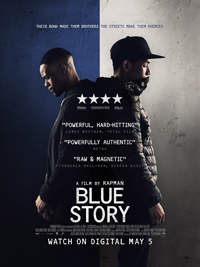Enemies, a Love Story: Rapman Rides the Waves of a Street War in Familiar Fashion
 Although it’s not quite West Side Story (1961), either in style or substance, the melding of musical interludes, blossoming romance and rival gangs tearing their neighborhoods asunder are also the trademarks of Blue Story, the Southeast London set debut from director/writer/producer Rapman (aka Andrew Onwubolu).
Although it’s not quite West Side Story (1961), either in style or substance, the melding of musical interludes, blossoming romance and rival gangs tearing their neighborhoods asunder are also the trademarks of Blue Story, the Southeast London set debut from director/writer/producer Rapman (aka Andrew Onwubolu).
Although its narrative features the universal underpinnings of Shakespearean tragedy (like West Side, it prizes the same adolescent mechanisms as Romeo and Juliet), the well-performed but familiar through line, developed from Rapman’s previous YouTube series, is often a bit too on-the-nose.
Paired with the repetitive musical summarizations from the director himself, each generating a truncated montage of the sequences we’d already witnessed but paired with sing-songy, socially conscious rap, Rapman’s latest doesn’t manage to feel as innovative as any of the film’s likely comparisons.
In Peckham, located in South London, a large British Nigerian community has earned it the nickname of Little Lagos. There, Timmy (Stephen Odubola) has grown up in a single-parent household and has made a tenuous place for himself at school thanks to his best friend Marco (Micheal Ward). Since Timmy is from a different neighborhood, which features its own gangs, such as the one run by Mads (Junior Afolabi Salokun) and Killy (Khali Best), Marco, whose older brother Switcher (Eric Kofi-Abrefa) controls their part of the hood, must often step up to protect his friend. But when Marco is in need of Timmy’s assistance one day while the latter is busy with his new girlfriend, Leah (Karla-Simone Spence), the resulting error ends their previous indivisibility. As their vehemence for one another becomes heated, tragedy will mark both their lives forever.
Blue Story owes a lot to early 90s American cinema, a fruitful period for a variety of Black directors, including John Singleton, Ernest R. Dickerson and, of course, Spike Lee. Whereas these portraits of South Central were able to meld specifics of location and culture with universal tenets, Rapman’s rival gangs and sparring characters often feel a bit loosely formulated. Instead, it’s a narrative which depends on certain taken-for-granted human behaviors and then uses them to propel the narrative forward, even if they don’t quite make sense.
The fall out between Timmy and Marco is born of miscommunication, and the impetus for Timmy’s eventual ill-planned vengeance a blind, senseless rage. The reappearances of Rapman and his verses hint at a classic tradition of oratory storytelling, but often feels like a wholly unnecessary attribute, especially considering Blue Story’s narrative is not difficult to follow.
Paired with a new generation’s obsession with recording each and every detail on social media, even to their own detriment, Timmy’s perversely public plan of vengeances makes sense in this milieu—but it robs both him and the narrative of logical and common sense. Would not lying quietly in wait to hunt one’s foe have been more beneficial? But perhaps this is the subtext of Blue Story, accidental or not, as it depicts the public posturing one must assume to survive in these streets—Timmy’s quest for vengeance keeps him tied to his childhood and stuck in a socioeconomic stranglehold. The catch is, the posturing is as much of a trap as the eventual violence leading lives to be cut short by death or prison.
★★½/☆☆☆☆☆


